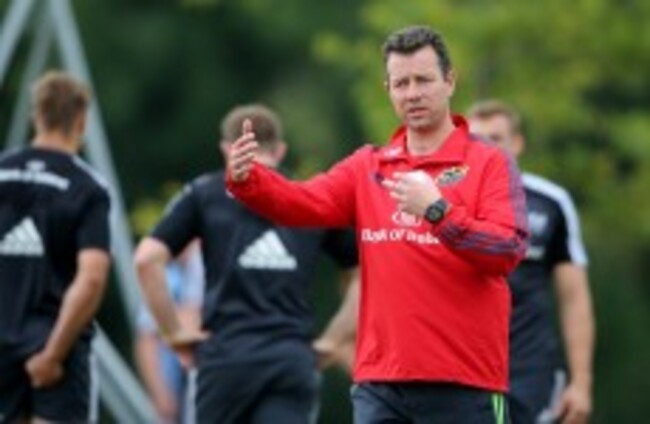MUNSTER’S ATTACKING TACTICS have been perhaps the most talked about aspect of the province’s life in the last two seasons, as Rob Penney’s Canterbury-infused wide patterns were met with a mixture of praise and criticism.
In that regard, the work of new attack and backs coach Brian Walsh, a former Munster centre, will be heavily scrutinised over the course of the 2014/15 campaign. The Corkman is in his first professional coaching role, but possesses a formidable knowledge of the game and firm beliefs about how it should be played.
While it would seem that analysing Munster’s attack in the last two seasons might have been a starting point for Walsh, who spent 10 years with Cork Constitution FC, he has not looked into the past for lessons.
“To be honest, I haven’t spent a lot of time reviewing last season’s attack,” Walsh told TheScore.ie. “I don’t think that’s something I needed to start the job with. I needed to look at what I think is going to be effective for the squad that’s there and go and put that in place.
It’s not a case of coming in and saying, ‘This has been bad, this has been good, change that, do that.’ It’s looking at building a balance and finding a game that suits the squad we have and the culture, environment and psyche of Munster.
“At the same time, [we have to] make sure that we’re not one-dimensional and make sure we have the ability to attack in different areas of the park. It’s about building that game, rather than analysing what’s happened in the past.”
Prompted to highlight Munster’s attacking strengths, Walsh immediately points to the back three, name checking Simon Zebo, Andrew Conway, Gerhard van den Heever and Felix Jones.
The former Ireland Clubs coach understands the need to allow such players to thrive with ball in hand, and admits that moving towards a playmaking, passing inside centre is in his thoughts.
“Absolutely. People talk about the second-five-eighth and this, that and the other. I don’t see why somebody can’t play 12 and be a good distributor at the same time. It’s something that’s very important in the modern game if you want to play in the wider areas of the park, if you want to play at a high tempo.
You need people who can fulfill that first receiver role on an ongoing basis and slot in and out. Absolutely, JJ [Hanrahan], Keats [Ian Keatley], Tyler Bleyendaal, Johnny Holland, all these guys have that kind of potential.”
Walsh does stress, however, that such a move is not the “master plan,” rather a single component of a system that will “evolve as the season goes on.”
The one-time midfielder – who helped Munster to beat Australia at Musgrave Park in 1992 – refers repeatedly to “balance,” be it in back play, in Munster’s attacking patterns or in any other aspect of their approach.
“You need a balanced back row, you need a balanced back line,” says Walsh. “You need people who can carry the ball and be very strong in the contact areas, but you need people who are potentially better ball players and distributors.
“It’s about putting all those together and finding the best positions for people to be effective.”
Walsh stepped away from a full-time and long-term job with Bank of Ireland to become part of Munster’s coaching team this summer. He admits he wasn’t “necessarily expecting” an offer to join Anthony Foley, particularly having relinquished control of Cork Con’s senior team last season.
Walsh spent his year away from senior coaching studying rugby and speaking to those in the game whose opinions he values, while keeping himself involved with Con’s U20s and Presentation Brothers College in Cork.
The additional “freedom to do research” allowed Walsh to challenge his own views on the game, reinforcing some notions and discounting others.
I was watching rugby and interacting with other coaches, finding out if there were things out there that I could be looking at, getting to different sessions and speaking to other people,” says Walsh.
“As the game changes, you need to change yourself. I was enjoying that when this job came around. I just think that personal development is a very important part. Everything changes, everything moves on and you’ve got to challenge yourself to stay on top of that.
“You’ve got to work hard on the personal development; I don’t think anyone’s ever ‘made it,’ to a certain extent. As soon as you think you have, you’re in trouble.”
The outcome of Walsh’s timely development is a firm belief in what Munster need to do to be successful. One aspect of that is moving away from playing through the phases simply for the sake of playing through the phases.
“Look, I wouldn’t be a huge fan of the multi-phase game. I think it allows defences to get organised. I think you need to get on the front foot and stay on it, try to keep the defence as unorganised as possible.
“You’re looking at players who have the ability to manage contact well, keep the ball alive, very strong continuity skills and make very strong decision based on what’s in front of them.
You’d love to be able to play that way, and that has to be part of what we try to do. But you have to be pragmatic as well, in terms of what you have and the conditions you play in.
“We have a very clear picture of where we want to get to. It’s going to take time to get there and we will build that game over time. I think it will certainly evolve as the season goes on, but it’ll be a balanced game.
“It might be a bit more direct than it has been in the past, but that doesn’t mean it’ll be one-dimensional and narrow.”














Forcing the other half to watch it here. Face on her like a bulldog chewing a wasp. This is soap revenge!
Face on her like a slapedarse
What, you are going out with Colin Montgomery?
Get her to watch a real game like rugby where men are men, and not wrapped up in swaddling and padding and a time out every 10 seconds and an ad break every 30 seconds and it goes on forever.
I told ye about Harvin during the week. Hope ye backed him for MVP. It’s looking likely at the moment.
I can verify this. I didn’t back it though.
I did however win my half-time show bets so I don’t mind too much.
What were they Steven?
That Bruno Mars wouldn’t wear a hat and one of the RHCP would be topless. Worked out around 18/1 for the pair
Did you really back that? Class bet if so. Some price considering two of the RHCP are always topless!
Yeah, fedora was odds on for Bruno which gave the value.
Nice one! You got some excitment out of this disappointing game, for neutrals anyway!
Bet in the morning Stephen
You were wrong pal. The easy money was marshawn lynch first td…. Money from America
Greetings from Seattle and a big shout out to everyone back home. Go Hawks
Cheers from the US–hope you’re not too bored watching American football and go Seahawks!
Watching from Ireland all one way traffic so far
What’s with all this super bowl nonsense these last few years? if the sport was Russian or Canadian or anywhere other than the USA, these fake fans wouldn’t bother their holes watching it, idiots buying into the hype is all
Sap.
Sorry you feel that way Dan but it’s not like this is anything new. There has been an American football league on the go in Ireland for decades so it’s not like it’s ‘recent’ or ‘idiots buying into hype’
You can read more here: http://thescore.thejournal.ie/american-football-in-ireland-1285463-Jan2014/
Yeah? Well..you know that’s just like….your opinion man….
Having a bad day Dan??? Cynical much??? #seahawksforsam
Go on the Steve put the puppet back in his box #needsawank
Dan, I think this is pretty much in every sport and not just NFL. You will always have people who follow a sport because its fashionable. I always find funny to see some guys on FB saying: Go Giants Go because they ve spent a summer in NY but probably have no idea whos their QB.
Can’t wait for the commercials every 30 seconds
More funking breaks than a kit kat factory
C4 didn’t have one ad break after half time. Not one.
About to emigrate to Colorado, and saw a few of their games already this season, so go Broncos!
Didn’t Colorado make weed legit lately?
Emigrated to Colorado last May. You’re gonna love it here. Good luck!
Hope to move there too in the future.. It’s so beautiful.
As did Seattle…
Moved here 4 years ago. Love it here. Great weather and great people. Look up GAA Club here Denver Gaels if you want to make some friends when you get here.
Come on the Broncos. For no other reason that during honeymoon in 2004 went to see Celtic v Chelsea in Seahawks stadium in Seattle. 10 years later despite god knows how many attempts, can’t get them to stop sending me bloody marketing emails!
How long before joe namath’s jacket has it’s own twitter account!
I’m watching it 1st time since ’86!!! With my 2 boys one who is getting up & going to college but night come home at lunch time and 1 who is having a ‘rest’ day from school tomoz – both worked today so I think they deserve it, I don’t work til 2 so I’m sorted
GO SEAHAWKS
Just watching for the first time……reminds me of a night out in Temple Bar before Christmas. Scraps and punch ups . Only thing missing , a couple of blades and some screaming slappers.
That’s the half time show
USA has a population 70 times the size of Ireland, and the capacity for tonights game is the same size as Croker. #golddusttickets
Yawn…..if it was such a great sport why isn’t it played all over the world?
Because it’s America footbal
It is.
You could say the same about hurling
Not in Wales….
Or New Zealand.
Or Russia, Eygpt or Iceland.
No American Football in Peru, Chile or Equador either.
whats with the body Armour and helmets? like rugby for pansies.
The “rugby for pansies” thing is soooo tired.
More than welcome to pop down to a training session try it out where you based. Teams all around Ireland. Played both myself and can certainly say hits in American football are a lot harder.
Far far harder. If they they take away the padding, then it would be just the same as rugby. What’s the point of that? We already have rugby.
What a crap sport rugby wins hands down
couldn’t agree more, total crap.
Its not crap. Its just different. Rugby is a better sport, but this is America’s thing. Enjoy it.
Peyton is going to light up this Superbowl. Go Broncos!!
My first time watching.
I loved Friday Night Lights so I want to watch and see if I actually like american football.
Hope I can stay awake.
You should really have watched a few regular season games first but welcome to the growing irish football family
The football family is the soccer one – the only sport played in every country on earth.
observations so far, no game should be this complicated. how can you enjoy it if there are SO many rules to keep track of. Seven refs, like. Well, we’ll see how it goes. Im gonna give it a fair chance.
Yes Bill. In all 209 countries……
Has The Vatican got a league, it is a country isn’t it?
The Vatican has a few teams. They play their home games there – in Rome leagues.
Correct – and the Vatican City also has an international side which has been managed by our old friend Trap!
Sarah it’s really not that complicated 2 honestly at the start of every season the commentary Is much more newbie friendly maybe try a few games in September , and as for the 7 refs it’s so they don’t miss anything and I think last night’s refs were very good they had no influence on the game which is the way it should be
I’m staying up, i do every year… loveeeee football!! Steelers fan, but have to go for the broncos for this one!
It should be called throwball, or runball for its certainly not football
You should write to the NFL with your suggestion, make sure to strongly word it. :0)
Just like gaelic football should be called handball.
Homer Simpson did a great job with the Denver Broncos considering he really wanted the Dallas Cowboys.
Sweet baby Jesus, please make this pre-game analysis END!!! #notgoinalast
That englisg lad om sky does my head in
Hate him!!
He’s better than that f***ing Cecil – I’m gonna say something really obvious then repeat it then repeat it again and finish with an earnest look so you think I’m intelligent. Worst on tv – even his co- commentators look like they’re saying “would you ever just shut up”
Just played it out on madden 25 broncos by 7 with champ bailey as mvp , hopefully that’s how it goes
Go Broncos
Nice name you have
Aww m a n. Really wish I was pqrt of the colm connolly club. Go bronco’s….
Cheers man
Well that was not what madden told me would happen sniff sniff
Even the Crane brothers must be loving the Seahawks right now.
By the time they return after half time, the game will be on around 2 hours, but they’ve only played a few minutes. Can we hope the game will finish before March?
No idea who I’m cheering for. Packers didn’t make it :( but hey at least the Patriots are out. I love Manning but I’m also a fan of the Seahawks aggression in defense… I think it’ll be close but I’m going to say Seahawks. Either way WOO HOO!!!
I know the feeling! An Eagles fan, so since the birds aren’t playing, nor are the Steelers (our mortal enemies – always root against the Steelers), ended up deciding on Seahawks as my sister lives in Washington. But fingers crossed it’s a good game either way!
Packers fan too.
So in keeping with the fellow NFC team, I’m rooting for the ‘Hawks.
How tp do think I feel as a 49ers fan? I think I out dissapoint both of ye
22-0
Good night.
It’ll be a tight game. Best offence v best defence. I hope it leads to an exciting game and they don’t cancel each other out.
I think Seahawks will edge it.
Can’t see it. Broncos by 10 id say
U have to explain why Leslie? Otherwise we call you a spoofer :)
Seahawks have a great defense but there is too many broncos w recievers. Then theres mannings arm
Ah here that’s exactly what commentators said 2 mins before you. Spoofer!! ;)
Leslie Ann Rock goes on every sports story and always gets it wrong. Every. Single. Time.
Not u again
Yep iamdebest is back again
Probably will tell me im the king of kildare and to get a job.
Broncos by ten, huh? How’d that work out for ya? Seahawks were awesome.
Perfect start for the Seahawks…
How valuable will those two points be in 3 hours
First scrap after only 30 seconds.
American football- kind of like rugby, but with body armor, helmets, and lots more and longer stoppages. Id love to see any American footballer tackle Paul o O’Connell, he’d ate them.
I’m a fan of neither sport, and therefore have no bias, but your ignorance is vast.
Yes, dude is quite thick.
Paul would eat them without the hype Jesus
The college graduates are doing bench-press drills of 102kg x 40 reps.
I don’t know if Pro rugby players do those stats, but I know our Paulie could not live with the explosive speed & strength of a line-man or linebacker.
Unless anyone knows POCs BP stats?
There are a number of former rugby players in the NFL, mostly from Australia and NZ. Interesting thing is that they’re mostly kickers or punters…or what we consider “the non-athletes” of the sport!
Don’t ya remember Miami trying to poach ROG?
Its because the skill of kicking the ball is so far removed as a skill from the rest of the game they have to import players that have the skillset
Go raiders oh wait
*shakes fist*
Any sightings of a “MAYO FOR SAM” sign yet?
Not yet but I promise you I won’t be posting it if there is. Kildare4Sam on the other hand….
Taxi for Broncos
Wore the big 18 today with great pride. Waited 15 years for this moment again. Broncos all the way. Omaha!!!
Sweet Jesus Colin Murray is one plank. What were channel 4 thinking?
I know.
I’d even take Vernon over him.
What was wrong with Nat coombs? He was wasted on the touchline.
I am so f**king drunk right now.
Go hawwwkkkksssssss !!!
Jasus lads
Snooze fest, I did try ;)
Think I’ll stick with Rugby
Would hate to be Floyd Mayweather right now.
First two Superbowls I saw the Broncos lost to Niners and Redskins. This is my third time seeing them in Superbowl. Notice a trend?
I was actually looking forward to this all day but now that I’m watching it, this superb owl programme isn’t so interesting….plus there’s no Seahawks in it yet
Follow george takei on Facebook do we?
George Takei?no why is that?
He made the same superb owl joke
Everybody makes that bloody joke it was funny once about 17 years ago and takai seems to think it’s funny every year but please for 2015 no superb owl jokes
Kick off return after halftime 2013…Touchdown. Kick off return after halftime 2014… Touchdown.
Helicopters? Where are the stealth bombers
Afghanistan
WTF Bruno Mars half time show,a bit like having Jedward perform in Croker on All Ireland final day! Chilli Peppers not on long enough
Did just seriously just compare a 2 time Grammy award winner with 10 million album sales and 58 million single sales with Jedward, you’re a moron.
Go to bed you mong
Your language is just as pitiful as your music knowledge.
Go watch some Glee or something Im trying to watch the game
I never seen Glee you must tell me about it.
Your correct in saying the Chillis should have been on longer. ☮
Conditions looking good ! I said earlier in the week that broncos would win by 7 + ,FORGET ABOUT IT ! Manning and the broncos by 15 !!! Keep an eye out for demaryous tomas tonite !!!!
That doesn’t look like queen Latifah unless she has gone down the Micheal Jackson route
Yeah I get mixed up between the anthem and America the Brave. Luckily I’m not American so that’s grand!
Y’all I ain’t got a clue about it but it’s Good tv ..
My UPC box just had a sh!t fit and reset itself. I need an activation code and god knows where that is. Not exactly a nail biter of a game but still. Talk about rubbish timing!
Hawwwwwwwlkkkkssssss!!
Go the Hawlks.
National Anthem drives me mad!
Bed early so Dan! Sweet dreams! Bronco’s all the way!
Sherman is going to steal it from the broncos I reckon
Up till its over work in the morn no problem gotta tell the naysayers
Fintan, I think I’m in love with your FB profile pic.
Yowzers!
Well that was an odd song choice Seahawks. Bit of a wimpy entrance…
Stephen O’Rourke, people like Dan don’t understand the game so negativity masks his ignorance about American Football.
Are the spectators provided with sick bags?
What a shite sport
What a Shite comment
Anyone else having a problem with the channel 4 coverage? The screen keeps blinking where I am watching.
DEFENCE
Horrible game, can’t fathom why people over here put themselves through staying up all night when there are proper sports this side of the Atlantic
Its not cool. Not even a bit.
And to think there are people that think manning is better than Brady! Choked again last night when the pressure came on, same as has done his entire career.
What time is kick off?
11.30
Bruno for half time!!!! Not cool!
Some game by the Hawks so far, very nervy start by the Broncos and it got worse from there.
Broncos trying to force Wilson to throw and go to his weaker left, but he has been coping very well so far!
Handegg.
Percy Harvin touchdown #CLASS #GameOver #WhiteWash?
WORST Super Bowl ever ! amazing how everyones jumped on the Seattle bandwagon ! so so boring and one sided – heres to a better one next year.
Its all going to hell for the Broncos….
… Plus the sound on C4 & C4hd has gone crackly…
I think the commentator guy with the eye on sky is high
It’s called bells palsey you idiot
Kevin
That is nothing to be joking about you idiot
Who’s singing the anthem this year?since it’s on fox it’s probably Zooey what’s her name
It was Queen Latifah.
Queen Latifah. Looking good too.
The national anthem was that opera one… Beyonce did it WAYYYYYYY better.
Renee Fleming sang the American National Anthem
Is it just me r do they wear a lot less ‘armour’ than they used to? Their shoulders seem to have shrunk